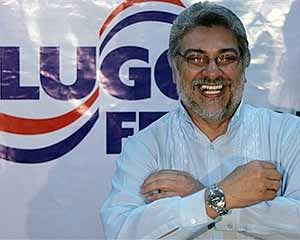01.05.2008
April 25, 2008 (the date of publication in Russian)
Ruslan Kostyuk
CHAVEZ'S IDEAS HAVE REACHED PARAGUAY
One more Liberation Theology priest elected President
 The day of April 20, 2008 provided more symptomatic evidence of contraction of US geopolitical influence in South America. Rev. Fernando Lugo, the oppositionist candidate, defeated Blanca Ovelar, the Minister of Education and protégé of leaving President Nicanor Duarte. The two candidates garnered resp. 40.8% and 30.8% of the national vote.
The day of April 20, 2008 provided more symptomatic evidence of contraction of US geopolitical influence in South America. Rev. Fernando Lugo, the oppositionist candidate, defeated Blanca Ovelar, the Minister of Education and protégé of leaving President Nicanor Duarte. The two candidates garnered resp. 40.8% and 30.8% of the national vote.
Mrs. Ovelar's failure marks the end of the 61-year domination of Colorado Party, named after Colorado, the Red River. Under its rule, Paraguay served as an example of faithful service to the United States as a principal ally on the continent. Since the end of the 35 year-long (1954-1989) dictatorship of General Alfredo Stroessner, the power had been kept by his party successors, and the announced democratization was expressed rather in mitigation of the political regime than in improvement of living standards.
During decades of Colorado's reign, the country has not achieved much economic and social progress. Despite rich energy resources, represented by one of the largest world's hydro plants on Parana river, a strong agricultural potential and promising possibilities for environmental tourism (half of the territory covered with virgin woods), Paraguay entered the XXI century as the poorest nation of South America. The ulcers of misery, with lots of unemployed and impoverished people, contrast to typical symptoms of corruption and nepotism in state bodies. The situation in health care, public construction and education is especially disastrous. Government agencies, intertwined with the Colorado Party apparatus, are profoundly inefficient, while the rural sector is until today controlled by 2-3 per cent of latifundists, around 300,000 rural citizens being landless.
During recent years, Paraguayan economy was controlled not only US but also Brazilian companies. The experience of neighbor countries, where power shifted to leftist governments, inspired by the example of Venezuela's Hugo Chavez, inevitably influenced the minds of Paraguayans as well, largely through the networks of the popular Liberation Theology clergy.
The ruling party, named after the Red River, was ironically challenged by a genuine "red" politician. Rev. Fernando Lugo, 56, originates from a poor peasant family. He had served for years in the rural area of San Pedro. In 2006, he personally organized a huge demonstration of protest against the government's social policy. The popular clergyman's advantage was his knowledge of the ethnic minority languages of the Guarami tribes.
For several years, Lugo has been involved in political struggle. During his election campaign, he organized over 300 meetings, managing to unify over 20 parties and movements into a single coalition named Patriotic Alliance for Changes.
Like Ecuador's Rafael Correa, the Paraguayan Liberation Theology preacher combined theory and practice in his activities. His eloquence and passion attracted lots of compatriots, sick and tired of Colorado Party's domination.
What changes does he promise to his nation? The central points of Fernando Lugo's political agenda is to overcome poverty, to create new jobs, to improve quality of health care, to establish independence of the judicial system from corrupted officials, and economic development, particularly the agrarian reform, based on social justice.
Fernando Lugo promises to boost South American integration in the framework of Mercosur. The fall of the last rightist government in the community of major countries of the South America's mainland, is really providing a strong impulse for regional integration. Paraguay is joining a powerful leftist alliance of states, already including Brazil, Argentina, Venezuela, Bolivia, Uruguay, and Ecuador.
"You've decided to liberate Paraguay", Lugo said, addressing his voters on the day of his triumph. "Now, we'll build democracy together!" The "red priest" was greeted by dozens of thousands people in the streets of major cities. Future will make clear whether the popular Catholic clergyman manages to implement his ambitious plans of political and social reforms which the majority of the Paraguayan nations had been dreaming of for decades.
Number of shows: 1183
 ENG
ENG 

 ENG
ENG 
